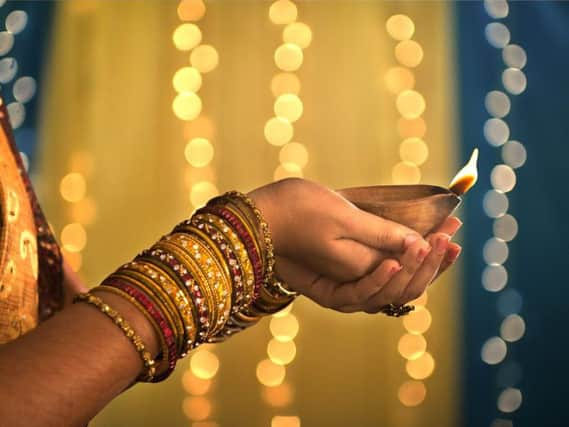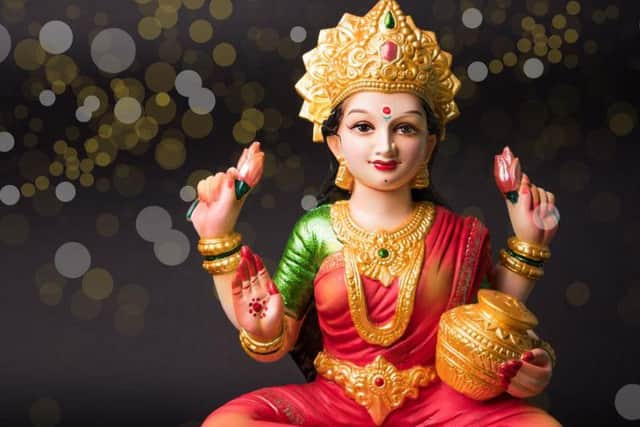When is Diwali 2019? Festival date, why it’s celebrated and Festival of Lights events in Belfast


Diwali, the four- to five-day long Festival of Lights celebrated by Hindus, Jains, Sikhs and some Buddhists, is taking place on 27 October this year.
One of the most popular dates on the Hindu calendar, Diwali symbolises the spiritual victory of light over darkness, and takes place each year between October and November after the conclusion of harvest and to coincide with the new moon.
How do people celebrate Diwali?


Advertisement
Hide AdAdvertisement
Hide AdDuring the celebration, streets, homes, offices and shops are illuminated with light, which acts as a metaphor for knowledge and consciousness.
Over the five-day period of the festival, people prepare by cleaning and decorating their homes.
The festivities reach their peak on the third day, Diwali, which falls on the darkest day of the Hindu lunar month, Kartik.
On this day, revellers dress up, light up their homes with oil lamps and candles (diyas) and worship Lakshmi, the goddess of prosperity and wealth.
Advertisement
Hide AdAdvertisement
Hide AdThey also light fireworks and enjoy a feast with their family, sharing mithai (sweets) and gifts.
What’s the history of Diwali?
The five-day Diwali festival was mentioned in Sanskrit texts and was first celebrated in the Indian subcontinent.
It’s likely to be a fusion of harvest festivals in ancient India, when the sun was celebrated as the cosmic giver of life and energy to life, which seasonally transitions in the Hindu calendar month of Kartik.
In a seventh century Sanskrit text, Indian emperor King Harsha refers to Deepavali and describes how lamps were lit and newly engaged brides and grooms received gifts.
What are the festive days of Diwali?
Advertisement
Hide AdAdvertisement
Hide AdThe names of the festive days vary by region and so do their rituals, but generally these are the five days of Diwali:
Dhanteras (Day of fortune) - the first day of the festival is when people start cleaning their homes and making decorations such as rangoli (patterns created on the floor using colored rice, dry flour, colored sand or flower petals).
Naraka Chaturdashi (Day of knowledge) - The Hindu literature narrates that the asura (demon) Narakasura was killed on this day by Krishna, Satyabhama and Kali. The day is celebrated by early morning religious rituals and festivities follow on.
Diwali (Day of light) - considered the main day of festivities, when fireworks are lit to celebrate the last day of the Hindu year. According to legend, Lakshmi, the goddess of wealth visits her devotees and bestows gifts and blessings upon each of them.
Advertisement
Hide AdAdvertisement
Hide AdAnnakut (New Year) - As an offering to Krishna in the festival of Govardhan Puja, food is piled up at Hindu temples.
Bhai Duj (Day of love between siblings) - Men offer women gifts on this day to show respect for them and offer them protection. Traditionally it was one of the few days when brothers could visit the homes of their married sisters.
How can I celebrate the Festival of Lights in Belfast?
Diwali is a time to reflect and celebrate love, forgiveness and knowledge and celebrations usually involve music, dancing, craft stalls and great food.
In Belfast, celebrations are taking place at the Mary Magdalene Parish Hall from 3.15pm to 6.15pm, and there will be a diverse cultural programme, with a four-piece band, local performers doing skits and dances and sparklers for children.
Advertisement
Hide AdAdvertisement
Hide AdThere will also be a vegetarian meal served up by Rajiv Prasad, and the night will be rounded off with dancing to traditional Indian music and a soft play area for children.
For more information and tickets, go to the event's website.